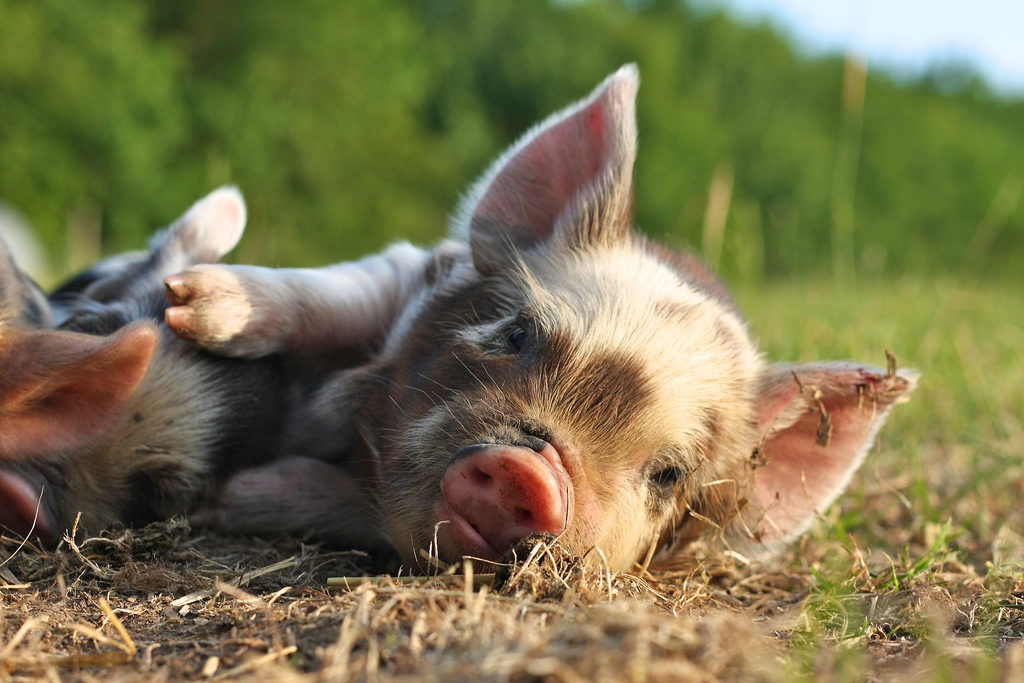İlham verici: domuz üreticisi veganist oldu ve şimdi sebze yetiştiriyor
Gün geçtikçe daha fazla hayvan ve hayvan ürünü üreticisi, bitkisel ürünlerdeki fırsatların farkına varıyor. En yakın örneklerinden biri de İsveçli Gustaf Soderfeldt’in hikayesi.

Soderfeldt 2006 yılında küçük ölçekli bir domuz çiftiliği kurdu. Büyük ölçekli domuz çiftliklerindeki uygulamaları korkunç ve inasaniyetten çok uzak bulan Soderfeldt bu yüzden küçük ölçekli, hayvanlara değer veren ve farklı bir çiftlik kurmaya kararlıydı. “Hayvan dostu et” yemek isteyen müşteri sayısı gün geçtikçe artıyordu ve Soderfeldt’in çiftliği büyük başarıya ulaştı. Ancak Soderfeldt gittikçe işin daha çok para kazanmaya odaklandığını fark etti. İsveç gazeteleriyle yaptığı söyleşide şöyle diyor:
“Müşterilerimiz bizim hayvanlarımızın nasıl ‘güzel hayatları’ olduğunu ve etlerimizin ne kadar ‘hayvan dostu’ olduğunu duymak istiyorlardı. Ancak kimse hikayenin korkunç kısmını duymak istemiyordu. Mesela yeni doğum yapmış bir annenin bebeklerinden hiç ayrılmak istemediğini veya kesimhaneye gitmek üzere kamyonlara bindirilen hayvanların korkudan çığlıklar attığını atlatmamı istemiyorlardı. Müşterilerimi elimde tutmanın tek yolunun doğruyu söylememekten geçmesi, kendimi günden güne haksızlık yapan biri olarak hissetmemi sağlıyordu.
Bizden et alan müşterilerimin çoğu vicdanlarını rahatlatmak isteyen kişilerdi. Hayvanlara korkunç muamele yapan bir endüstriyi desketlediğini kimse itiraf etmek istemiyor. Bu nedenle ‘hayvan dostu’ et alıyorlar. Et endüstrisinin koruyucu zırhı olmak günden güne daha da zor hale geliyordu”
Veganizm tarımın geleceği
Soderfeldt YouTube sayesinde veganizmle tanıştığı zaman ‘hayvan dostu’ et diye birşey olmadığının farkına vardı. Dört sene önce veganistlerin aslında kendisiyle aynı şeyi istediğinin farkına vardı: hayvanların iyi bir hayatının olması. Çiftliğini asıl kurulma amacı buydu. Ama veganistler bir adım daha ileri gidiyorlar: eğer gerçekten hayvanlara değer veriyorsan, onları öldürmezsin. Soderfeldt eskiden sağlıklı olmak için et yemek gerektiğini düşünüyordu, ancak bunun gerçek olmadığını öğrendi.
Karısıyla birlikte veganist oldular, hayvancılığa son verip sebze tarımına başladılar, hayvansal herhangi bir katkı maddesi veya hayansal gübre kullanmadan. Değişim hiç de kolay olmadı ve tabii ki tüm müşterilerini kaybettiler. Ama dört seneden sonra şu anda çiftliklerinde domates, patates, fasulye, bezelye, marul, havuç, lahana ve çiçek yetiştiriyorlar. Bunları abonelik sistemi ile ve çeşitli pazarlarda stand kurarak satıyorlar.
Soderfeldt veganizmin tarımın geleceği olduğuna inanıyor. Hayvancılıktan daha ‘barışçıl, sağlıklı, verimli, ziyanı daha az ve çevre dostu’.
Increasingly more farmers see opportunities in vegetable agriculture, without the use of animals. One of the most recent examples is the story of the Swedish Gustaf Soderfeldt.

In 2006, Soderfeldt set up a small-scale pig farm. He believed that the way animals were treated in industrial animal farming was horrific and he wanted to do it differently: small-scale, with respect for animals. The number of customers that wanted his ‘animal-friendly’ meat grew considerably and the company was a great success. But Soderfeldt realised that it increasingly came down to money. Soderfeldt told a Swedish newspaper:
“Our customers liked to hear that our animals had lived a ‘good life’ and how ‘animal-friendly’ our meat was. But they didn’t want to hear about the bad side. For example, I couldn’t tell them that a sow didn’t want to be separated from her piglets at all and that the pigs screamed with fear when they were loaded onto the truck to bring them to the slaughterhouse. The only way to keep my customers was to conceal the truth and my life as a pig farmer felt less honest every day.
Most of our customers bought their meat with us to ease their conscience. People don’t want to admit that they support an industry that treats animals horribly. That’s why they buy so-called ‘animal-friendly meat’. It became more and more difficult for me to promote the meat industry.”
Veganism is the future of agriculture
When Soderfeldt came into contact with veganism via YouTube he realised that ‘animal-friendly’ meat doesn’t exist at all. He copped on four years ago and realised that vegans wanted in fact the same thing as he did: animals living a good life. After all, that was originally the concept for his farm. But vegans go even one step further in this: if you really care for animals you won’t kill them at all. Soderfeld also used to think that people needed to eat meat to stay healthy but he soon learned that that wasn’t true.
He and his wife became vegans, stopped keeping animals and changed to growing vegetables, without the use of animal products such as blood meal, bone meal or animal manure. The transition was not easy and they lost almost all of their customers. But after four years the company is back on its feet and they now grow tomatoes, potatoes, beans, peas, lettuce, carrots, onions, cabbages and flowers among others. The sell them on various farmer markets and via vegetable subscriptions.
Soderfeldt is convinced that veganism is the future of agriculture and that it is ‘peaceful, healthier, more efficient, less wasteful and more environment-friendly’ than animal agriculture.